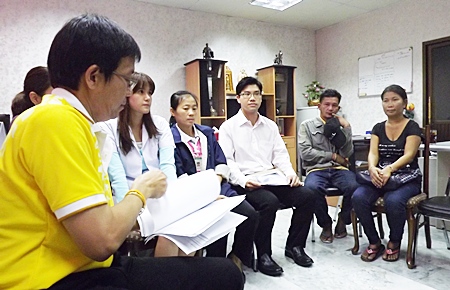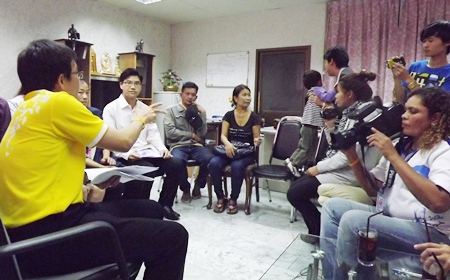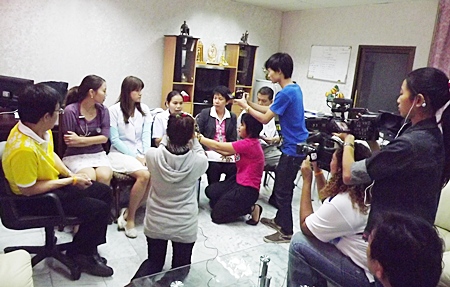Already under fire for alleged negligent treatment of a teenager’s severely broken leg, Banglamung Hospital doctors now are being assailed for nearly killing a Sisaket woman with an overdose of sedatives.
Maneeporn Phukrongthung, 41, contacted media outlets Dec. 13, alleging that a visit for treatment of stomach pain and diarrhea nearly proved fatal when she was tied to her bed, injected with a sedative that plunged her into coma and liver failure. Only a last-ditch transfer back to a Sisaket hospital saved her life, she said.
Having just faced the media four days earlier to defend the hospital’s decision to send home untreated a 17-year-old girl who had suffered a compound leg fracture, Banglamung Hospital Director Narongsak Ekawatnakul again insisted that doctors had done nothing wrong.
 Maneeporn Phukrongthung and her husband Namchai (both seated right) listen to Dr. Narongsak Ekawatnakul (left), director of Banglamung Hospital as he tries to explain what happened.
Maneeporn Phukrongthung and her husband Namchai (both seated right) listen to Dr. Narongsak Ekawatnakul (left), director of Banglamung Hospital as he tries to explain what happened.
Instead, he painted Maneeporn as an alcoholic who had contracted hepatitis due to excessive drinking, then was restrained and sedated after going into alcohol withdrawal. He said while the cocktail of sleeping pills and anti-anxiety medication she was given could have side effects on liver function, the dose given was too small to cause the deleterious effects the Issan resident alleged.
“Banglamung Hospital insists that the treatment and diagnosis provided to Mrs. Phukhrongthung was according to standard medical care,” Narongsak said. “Any severity in her condition was due to complications according to the condition and disease of the patient at the time.”
Maneeporn’s ordeal began Dec. 13 when her husband dropped her off to get relief for diarrhea and stomach cramps. Emergency room personnel admitted her, however, setting her up in a woman’s ward where she’d have to wait until the next day to see a doctor.

That evening, she said, she began feeling poorly and sought out nurses. Dizzy and stumbling, the patient was taken back to her bed where she stayed only a few minutes before getting up and stumbling for help again. Maneeporn claims the nurses berated her for going on a “rampage,” tied her hands and feet to the bed, then shot her up with drugs to keep her quiet.
Narongsak countered that Maneeporn was restrained for her own protection, as she was “dizzy and confused” because of alcohol withdrawal, even though she’d been in the hospital only for a few hours.
“This patient had a history of hepatitis from excessive drinking,” Narongsak told the media. “She entered the hospital for stomach pains and it was confirmed hepatitis was associated with those symptoms.”
Shortly after being given the shot, Maneeporn began feeling numb, she said. Soon she was paralyzed, couldn’t open her mouth or talk and then fell into unconsciousness.
Her husband, Namchai, said his wife was totally unresponsive when he was finally allowed to see her the next day. But when he went to check on her again that evening, he found she’d been sent, without his permission or knowledge, to Chonburi Hospital.
Doctors there told Namchai the next day his wife now needed a ventilator to breathe, had lost 20 percent of her brain function and that her liver was failing. He was asked if he wanted to remove her from the machines and let her die naturally.
Before answering, Namchai consulted with relatives in Sisaket, he said, who convinced him to pay for Chonburi Hospital to use its ambulance to send her to Issan. Maneeporn spent two days in a hospital there and quickly recovered fully.
Narongsak again defended the hospital’s actions, saying the injection she received from nurses was a mild mix of sleeping pills and anti-anxiety medication. “The drug may have side effects on the liver, but the doctors had analyzed this and saw fit to use only a small dosage according to the patient’s condition,” he said.

Asked why Maneeporn fell into a coma, the hospital director surmised it was due to existing liver disease from drinking or hepatitis. Uncertain of what had happened, they turned the matter over to Chonburi Hospital, he said.
Again pushed by reporters as why the woman made such a fast recovery once out of Banglamung’s care, the hospital director argued it was because “the severity and symptoms of her disease had begun to subside and she was able to adapt and respond.”
Now healthy, a furious Maneeporn and her husband returned to Pattaya demanding justice and contacted media to warn people to the standard of care being given at the low-cost medical center.




